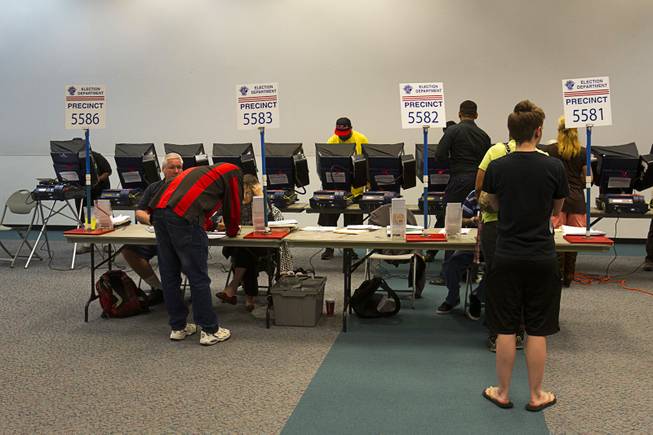
Voters cast their ballots on Election Day on Tuesday, Nov. 6, 2012, at Cambridge Recreation Center.
Tuesday, Feb. 24, 2015 | 2 a.m.
Election experts in Nevada and elsewhere say proposed voter ID laws would do nothing to prevent the casting of illegal ballots.
But a cohort of right-wing lawmakers are convinced a voter ID mandate will uphold the integrity of election day in Nevada, leaving critics of the bill scratching their heads about the need for the proposed law.
Senate Bill 169 echoes a soap-box issue for the GOP nationwide and presents a way to block one type of voter fraud: people who use a false identity to cast a ballot.
Similar reforms have swept the nation since 2010 and are enacted in 34 states. Lawmakers broached the topic in Nevada’s last two legislative sessions.
But while some Republicans tout the bill as a much-needed reform, there appears to be little need of repair.
Since 2008, there were four cases of voter registration fraud and one case of voter fraud in Nevada, according to the secretary of state’s office.
Showing an ID at the polls would likely not have prevented Nevada’s cases. The cases involved a woman who attempted voting twice, another who illegally registered and others where people were paid for registering a quota of constituents.
Nationwide, the data are similar.
Justin Levitt, a professor at Loyola Law School, scoured election documents, newspapers and court records across the country to see how many times showing an ID at the polls could have thwarted a fraudulent voter.
Out of 1 billion ballots cast since 2000, he found 35 reported cases of fraud where showing an ID at the polls could have thwarted a phony vote.
He estimates that a handful of the cases weren’t fraudsters either. Most came from single ballots cast by a family member in a relative’s name, he said.
“It's an exceedingly cumbersome and awkward way to try to steal an election,” he said. “So I wouldn't expect it to happen regularly.”
Republicans have fashioned a commerce-based argument in fighting for the bill.
GOP Assemblywoman Michele Fiore compared voting to buying alcohol.
“I think voting is more serious than buying a bottle of wine," the Associated Press reported her saying. "So if I have to show ID to buy wine, I should show ID to vote."
But Levitt disagreed with her logic.
Voting is a constitutional right and buying wine isn’t, he said
“While most people do have the right kind of ID,” he said. “It’s not true that everyone has the right kind of ID. This fight is not about the people who have it. It’s about what to do for the people who don’t have the right kind of ID.”
The bill would call for the Department of Motor Vehicles to issue — free of charge — voter registration cards. It requires someone to provide proof of residence and birth in order to receive a card. The state has yet to estimate a cost for providing IDs.
Critics pan the idea as a waste of money and time.
Sen. Aaron Ford, the Democratic leader in the chamber, said his party would do what it could to stop the Republican measure from passing.
“Our focus remains on protecting the rights of voters and ensuring elections are free, fair and accessible for all law-abiding Nevadans,” he said.
The Nevada ACLU said the law would discriminate against minorities and low-income voters.
Producing the kind of documentation needed for an ID — like a copy of a birth certificate or a Social Security card — isn’t always easy, Levitt said.
“Nobody emerges from the womb with papers in hand,” he said.
The U.S. Justice Department raised concerns with Texas’ austere voter ID laws in a 2012 memo, saying Hispanic voters in the state were at least 46 times more likely than non-Hispanics to lack ID.
North Carolina will require voters to show ID beginning in 2016. The state’s election board weighed the effects by comparing DMV and voter registration data, estimating that 107,000 black voters could be blocked from the polls.
Nationwide, 11 percent of citizens don’t have photo ID, according to a study from New York University’s Brennan Center for Justice, a nonpartisan policy think tank.
Bill sponsor Sen. James Settelmeyer said the bill is modeled after one in Indiana, where a state Supreme Court decision found a voter ID law constitutional.
He said he and his peers “want to make sure that the people who are voting should be voting.”
Republican Gov. Brian Sandoval is staying neutral on the bill and other election legislation “until they reach his desk,” said Mari St. Martin, Sandoval’s spokeswoman.
While voter ID garners attention, lawmakers are missing out on tightening laws against more pervasive forms of election fraud: Stuffing ballot boxes, coercing votes, paying for votes and forging absentee ballots, Levitt said.
He emphasized absentee ballots “as a much more efficient way to steal an election.”
A pool of investigative journalists who researched voter fraud nationwide found 491 cases of absentee ballot fraud nationwide that ended with convictions, acquittals and dropped charges.
As a way to combat absentee fraud, Kansas and Wisconsin recently required voters to send in proof of ID when they mail in ballots, Levitt said.

Join the Discussion:
Check this out for a full explanation of our conversion to the LiveFyre commenting system and instructions on how to sign up for an account.
Full comments policy